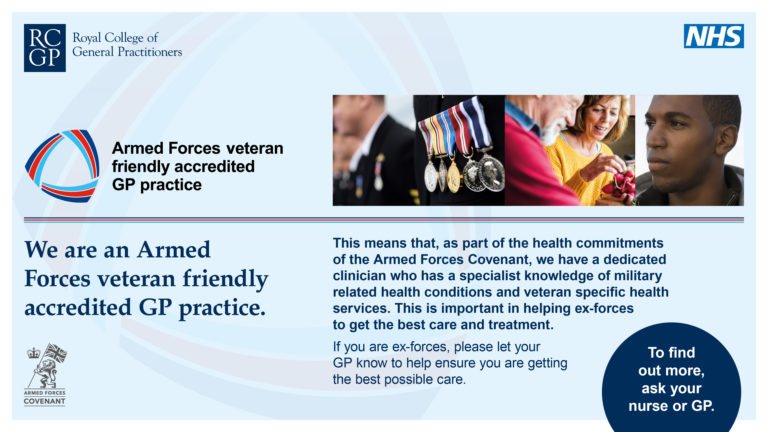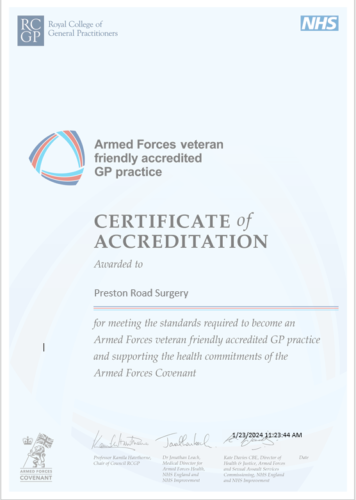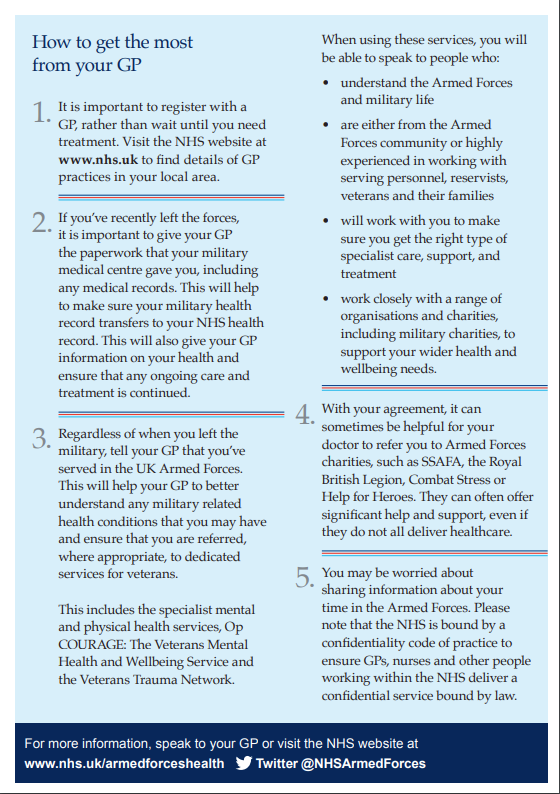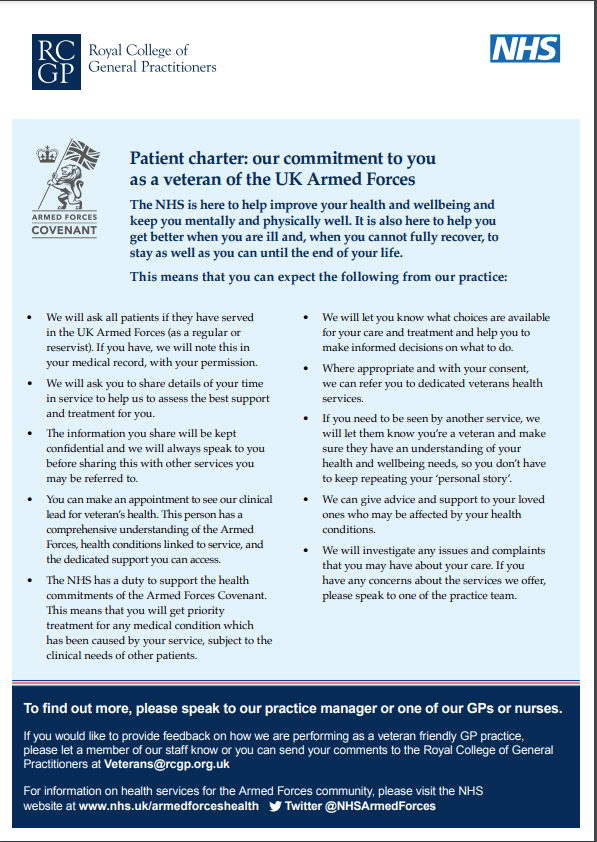We at Preston Road Surgery are delighted to be a certified veteran friendly practice.


What is a veteran?
A veteran is anyone who has served for at least one day in the Armed Forces, whether as a
regular or reservist. It means the same as ‘ex service personnel’ or ‘ex-forces’, although not
all veterans know the term or choose to associate with the term ‘veteran’. Younger veterans
might refer to themselves as ‘ex-forces’, in the belief that a veteran is someone who fought
in the First / Second World War.
What is the RCGP advice on veteran’s health?
Whilst many aspects of the health needs of veterans are the same as for the general public,
there are sometimes significant differences, particularly in relation to conditions attributable
to service life and the associated impact for individuals and their families. These differences
can be reflected in the way in which healthcare is delivered, the range and types of some
specific services provided and the long-term impact upon patients and families.
What is the armed forces covenant?
The NHS has a duty to deliver on a number of health commitments, which are set out in the Armed Forces Covenant as follows:
- The Armed Forces community should enjoy the same standard of, and access to healthcare as that received by any other UK citizen in the area they live.
- Family members should retain their place on any NHS waiting list, if moved around the UK due to the service person being posted.
- Veterans should receive priority treatment for a condition which relates to their service, subject to clinical need.
- Those injured in service should be cared for in a way that reflects the nation’s moral obligation to them, by healthcare professionals who have an understanding of the Armed Forces culture.
This is reflected in principle four of the NHS Constitution, which states ‘the NHS will ensure that in line with the Armed Forces Covenant, those in the Armed Forces, reservists, their families and veterans are not disadvantaged in accessing health services in the area they reside’.
The Covenant is an important aspect of our approach to care, especially as the Armed Forces community can be at a disadvantage due to their mobility and frequent moves.
Healthcare for the armed forces community
How the NHS can help if you’re in the British armed forces or are a veteran, a reservist or a family member of someone who is serving or who has served.
- Mental health support
- Veterans, service leavers, and non-mobilised reservists
- Information and support for families
- A guide to NHS services
- Charities and support groups
- Step-by-step guide for service leavers
- Accessing NHS healthcare while in active service
What dedicated NHS services and support are available to veterans?
Op COURAGE: The Veterans Mental Health and Wellbeing Service
In March 2021, NHS England and NHS Improvement announced the new name for its
veterans mental health services; Op COURAGE: The Veterans Mental Health and Wellbeing
Service. This is the new overarching name for the Veterans’ Mental Health Transition, Intervention and Liaison Service (TILS), Veterans’ Mental Health Complex Treatment
Service (CTS) and Veterans’ Mental Health High Intensity Service (HIS). The new name has
been developed following feedback from veterans and their families to make it easier for
those leaving the military and veterans to find help.
Op COURAGE provides specialist care and support for Service leavers, reservists, veterans
and their families who can self refer or ask a GP, charity or someone else to refer them
For further information on Op COURAGE: The Veterans Mental Health and Wellbeing Service, including the contact details for the service in your region
Website
Mental health support for veterans, service leavers and reservists – NHS (www.nhs.uk)
Veterans Trauma Network (VTN)
The VTN is the first NHS veterans’ physical health care pathway, providing care and
treatment to those with a service-attributable healthcare problem. Located in thirteen major trauma centres (Birmingham, Brighton, Bristol, Cambridge, Leeds, Liverpool, London (three centres), Middlesbrough, Nottingham, Oxford and Plymouth) across England, the VTN works closely with Defence Medical Services, national centres of clinical expertise and Op COURAGE, as well as military charities to provide a complete package of care.
It is run largely by healthcare professionals who are either veterans or serving members of
the Armed Forces.
GPs can use a single national email to refer veterans to the service, england.veteranstraumanetwork@nhs.net.
Op RESTORE: The Veterans Physical Health and Wellbeing Service
The Veterans Trauma Network (VTN) is now called Op RESTORE: The Veterans Physical
Health and Wellbeing Service. This brings the service in line with the following NHS
services in England, providing a recognisable suite of services for the Armed Forces
community:
- Op COURAGE: The Veterans Mental Health and Wellbeing Service
- Op NOVA: Supporting Veterans in the Justice System
- Op COMMUNITY: Armed Forces Community Support
The decision to rename the VTN, Op RESTORE, was informed by engagement with veterans, providers and charities, with the aim of supporting improved access to and awareness of this service. Whilst there are some things that the NHS will not be able to restore in full, we aim to support veterans restore their health and quality of life as best we can.
Op RESTORE is a service for anyone who has served at least one day in the UK Armed Forces and, as a result of their service, acquired a significant, lasting physical illness or injury. Op RESTORE will continue to accept only GP referrals; GPs can obtain a referral form by emailing imperial.oprestore@nhs.net
Op RESTORE uses a network of both civilian and military consultants, along with welfare
support from military charities, to support a veteran’s health using a holistic approach. Whilst Op RESTORE cannot shorten NHS waiting times, it seeks to ensure the veteran ‘waits well’ and is seen by the most appropriate clinician for their needs.
Website
Veterans, service leavers, and non-mobilised reservists – NHS (www.nhs.uk)
Veteran services: Op FORTITUDE
Veterans across the UK will have access to Op FORTITUDE, a new dedicated referral
pathway for homeless veterans, including those sleeping on the streets.
The hotline is part of a two-year £8.55 million programme to fulfil the Government’s pledge to end veteran rough sleeping. The Veterans’ Strategy Action Plan 2022-24 sets out the
intention to achieve this within the current Parliament, but thanks to new funding this is set to be achieved ahead of schedule.
The housing hotline, delivered by Riverside group, will give homeless veterans a single point of contact to get them the help they need. Op FORTITUDE staff will refer callers to a
network of support, including housing providers, charities and local authorities. The
programme aims to support 1,300 veterans over two years across almost 60 housing
complexes, ranging from apartment blocks to shared houses.
Projects delivered by nine housing providers will support veterans to thrive in civilian life.
Wraparound services include specialist medical care, connections with local communities
and the tools they need to get jobs.
All nine projects will be ready to take Op FORTITUDE referrals by September 2023,
expanding the pathway’s network of housing providers from 10 to 14. This includes plugging into a network of 650 homes across Scotland with Veteran Homes Scotland, as well as a brand new consortium of housing across the North West of England.
Veterans who are homeless or at risk of homelessness and the organisations working
with them are encouraged to contact the Op FORTITUDE hotline from Monday 3 July
2023 on 0800 952 0774 or through a secure web portal at www.riv.org.uk/opfortitude.
Website
Veterans services – Riverside Group
Operation Stirling
Age UK, in partnership with Fighting With Pride, is delivering Operation Sterling – a
programme to help older LGBT+ veterans, who were adversely affected by the ban on
LGBT+ personnel serving in the Armed Forces.
Before 12 January 2000, there was a ban on LGBT+ personnel serving in the British Armed
Forces – those who did sign up were forced to hide their identity. Because of the ban,
thousands of LGBT+ service personnel were removed or forced to leave service. For some,
this meant not only losing their jobs, but also friends and family, as well as access to
pensions that they’d earned while serving the country.
Operation Sterling will provide telephone based support, advice and casework to older
LGBT+ veterans through Age UK’s Advice Line; combining the expertise of Age UK together
with the expert knowledge of Fighting With Pride. Operation Stirling will be able to help older LGBT+ veterans access financial support, housing options and social care.
LGBT+ veterans who served in the Armed Forces who would like to access Operation
Sterling’s specialised support, can do so by visiting the Fighting With Pride website
to start the referral process.
Website
Get in Touch (fightingwithpride.org.uk)
SARCs
Sexual assault referral centres (SARCs) offer medical, practical and emotional
support to anyone who has been raped sexually assaulted or abused. They have specially
trained doctors, nurses and support workers who provide a safe space and dedicated care.
Help is available 24 hours a day for everyone, whether the incident was recent or nonrecent. Individuals can contact their nearest SARC to make an appointment. Further
information is available at www.nhs.uk/sarcs or click link below:
Website
Help after rape and sexual assault – NHS (www.nhs.uk)
Prosthetics
The Veterans’ Prosthetics Panel (VPP) was established in 2012 as a way of ensuring that veterans can access high quality prosthetics regardless of which Disablement Service Centre (DSC) they attend. This additional funding is available only to veterans who have lost a limb whilst in military service. A veteran who has left the Armed Forces, but whose limb loss is attributable to an injury sustained whilst in service, also qualifies. Veterans who lose limbs after they leave the military or suffer limb loss whilst in the military, but not in a service attributable incident, such as in a civilian road traffic accident, will continue to access services as usual through their local DSC.
The additional funding for eligible veterans is for treatment that would not typically be
provided by the NHS, for example higher specification prostheses than are normally
available on the NHS. Funding is approved on a case by case basis, with DSCs making
individual funding applications to the VPP, which set out the expected requirement and
benefit if the request is supported. More information is available on the NHS webpage on
services for veterans with physical injuries.
Eligible veterans are also able to access the Complex Prosthetics Assessment Clinic (CPAC), which is run by Defence Medical Rehabilitation services. CPAC supports veterans with particularly complex prosthetic socket needs who have previously been seen at the Defence Medical Rehabilitation Centre at Headley Court.
Personalised care programme for ex-forces with a long term physical, mental or neurological health condition or disability
NHS England and NHS Improvement, together with the Ministry of Defence, have published
the Personalised care for veterans in England, a guide for clinical commissioning
groups and local authorities, which sets out a personalised care approach for those
veterans who have a long term physical, mental or neurological health condition or disability.
This guide is for individuals and organisations who are leading or involved in supporting this patient group through the delivery of NHS Continuing Health Care or a jointly agreed care plan.
Eligible individuals will have a single personalised care plan for all their health and wellbeing needs that is developed with them and a range of organisations, including health and social care and military charities. This approach will give the individual more choice and control over how their care is planned and delivered, meaning they can choose how best to live their life and get the right care and support to make this happen. It will also take into account personal preferences that relate specifically to the individual’s military service. As part of this, they may get a personal budget to pay for some of the care and support they need, as well as more support in the community, such as emotional and practical support from people who have similar health conditions or disabilities. To apply, individuals should contact their local clinical commissioning group.
The Veterans Covenant Health Alliance (VCHA)
The VCHA aims to improve NHS care for the Armed Forces community by supporting trusts,
health boards and other providers to identify, develop and showcase the best standards of care. Over 70trusts have already been accredited as ‘Veteran Aware’, having demonstrated their commitment to eight core manifesto standards, including signing the Armed Forces Covenant, raising awareness of veterans’ healthcare needs among staff, and establishing links with local support providers. The VCHA is working with many more trusts to achieve accreditation.
Website
Veterans Covenant Healthcare Alliance – Veterans Covenant Healthcare Alliance (veteranaware.nhs.uk)
5 top tips for veterans

More information on NHS services for veterans can be found on the NHS website here.
What other services are available to veterans?
Hearing loss and tinnitus services
In-service (MOD DMS) and veteran (NHS) provided hearing devices are provided to meet a
clinical need. Veterans requiring hearing devices and tests should access via their GP and
local provision, where NHS providers will be able to take account of service-related hearing
issues. Private providers may, at personal cost, be able to provide non-standard equipment
and devices.
Website
Hearing aids and implants – NHS (www.nhs.uk)
Mobility equipment support
The Royal British Legion has a Veterans’ Mobility Fund, which provides specialist wheelchairs, orthotic equipment and other mobility related items for veterans who have a service related serious physical injury and whose needs cannot be met through statutory services. Eligibility for the fund requires the condition to be attributable to service and typically applicants will be in receipt of a War Pension or relevant award under the Armed Forces Compensation Scheme.
Website
Support for veterans | Royal British Legion
Veterans’ Gateway
The Veterans’ Gateway is made up of a consortium of organisations and Armed Forces charities, including The Royal British Legion, SSAFA, Combat Stress and Connect Assist. It is a main point of contact for veterans seeking support, putting them and their families in touch with the organisations best placed to help with the information, advice and support they need – from healthcare and housing to employability, finances, personal relationships and more.
Website
Advice and support for veterans & ex-forces | Veterans’ Gateway (veteransgateway.org.uk)
Contact
Contact is a group of charitable, support and state organisations that have joined forces to
enhance mental health support available to the Armed Forces community. The partnership
consists of Big White Wall, Cobseo, Combat Stress, Help for Heroes, The Royal British Legion, Walking With The Wounded, the NHS, the MOD, the UK Psychological Trauma Society and
King’s College London. Contact aims to improve collaborative care management, increase
instances of help-seeking behaviour, improve service provision, encourage best practice across the sector and improve public knowledge of what support is available and how best to access it.
Website
The Contact Group | Collaborating for Military Mental Health (contactarmedforces.co.uk)
Cobseo
Cobseo, as the Confederation of Service Charities, offers membership to charities who promote and further the welfare and general interests of the Armed Forces community, subject to fulfilling the membership criteria. Comprising 255 members, Cobseo provides a single point of contact for interaction with the Armed Forces community.
Website
Cobseo – The Confederation of Service Charities
Help for Heroes
Help for Heroes provides direct, practical support for wounded, injured and sick service
personnel, veterans and their loved ones from any conflict. They have four recovery centres in the UK offering medical care, guidance, support and advice. Patients can self-refer or be referred by a professional. Once referred, an initial assessment will take place within one to two weeks and there is no waiting list for treatment.
Website
Get Help and Support: Help for Heroes – Empowering Veterans | Help For Heroes
Combat Stress
Combat Stress is the UK’s leading mental health charity for veterans. It provides free specialised clinical treatment and support to ex-servicemen and women across the UK with mental health conditions. Combat Stress has a strategic partnership with the MOD and the Department of Health and Social Care. This enables the charity to work with NHS mental health to develop services suitable for military veterans.
Website
Mental health services for veterans | Combat Stress
Blesma
Blesma supports limbless veterans to lead independent and fulfilling lives. Blesma is dedicated to assisting serving and ex-service men and women who have suffered life-changing limb loss or the use of a limb, an eye or loss of sight. They support these men and women in their communities throughout the UK and provide centralised assistance to those living overseas. Blesma works closely with the NHS to ensure the latest advances in the relevant medical fields are converted into practical solutions that can benefit all of their members. They do not provide members prosthetics, but they do help prosthetists develop their skills at undergraduate and PhD level.
Website
Military Charity for Limbless Veterans | Blesma
Patient charter: our commitment to you as a veteran of the UK armed forces
